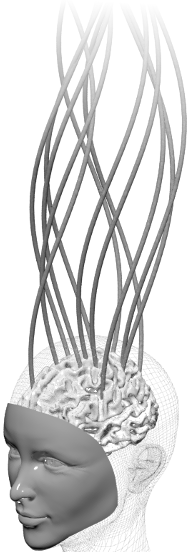EmoAdapt: Brain-driven adaptive virtual reality for integrating emotions into human-machine interactions
Currently, human-machine interactions rely predominantly on the manual input of data and to a minor extent on recognition of facial expressions, speech or motion. It is known that emotion-related factors such as unexpected behavior of a machine, delay of interactions or lacking responses or successful use of a machine will cause emotional reactions on the human side like stress, anger, or excitation. More importantly, human-machine interaction may be hampered by reduced attention due to fatigue or distraction. However, these factors are often not recognized by the machine which may lead to inadequate reactions of the machine during human-machine interactions.
The rationale of the EmoAdapt project is to recognize the emotions on their source, the brain, and to integrate additional psychophysiological factors that reflect emotional reactions such as heart rate, respiration, or skin conductance. Using state-of-the-art neuro-imaging techniques of brain activity detection, we will measure brain activity patterns generated by and associated to emotions and emotional dispositions. Next, we measure the brain activities that arise during an interaction between man and machine. This is realized using real-time functional magnetic resonance imaging (rt-fMRI) at magnetic fields of either 7 Tesla or 3 Tesla and by real-time acquisition of electroencephalogric signals (EEG). In a later stage, rt-fMRI and EEG will be combined. To simulate a fully realistic environment that can be controlled both by computers and humans we will use a novel approach to adapt the VR scene according to the emotional state of the user. This adaption occurs in real-time which will allow to realize new classes of experiments. Summarizing, we will develop novel strategies of human-machine-interactions which include and rely on neurobiologically motivated parameters and direct brain signals to access the emotional state of the user. Ethical, legal, and data protection aspects will be also considered.
The EmoAdapt project is a collaborative project involving research groups from the Otto-von-Guericke-Universität Magdeburg (Project leader, PI: Prof. Dr. Dr. J. Bernarding, Department of Biometry and Medical Informatics, IBMI; PI: PD Dr. K. Krauel, Department of Child and Adolescent Psychiatry and Psychotherapy (KKJP); PI Prof. Dr. E. Brinkschulte, Department of the History, Ethics, and Theory of Medicine (GET)), and the Leibniz Institute for Neurobiology at Magdeburg (PI: Dr. A. Brechmann).
Project duration: 1 May 2015 – 30 April 2018
Project Manager:
PD Dr Marcus Hauser
Department for Biometry and Medical Informatics
Tel.: +49-391-67-13541
E-Mail:
OVGU-Contact:
Prof. Dr. Dr. Johannes Bernarding
Department for Biometry and Medical Informatics
Tel.: +49-391-67-13535
E-Mail:
LIN-Contact:
Dr. André Brechmann
Special Lab Non-invasive Brain Imaging
Tel.: +49-391-6263-92161
E-Mail:
KKJP-Contact:
PD Dr. Kerstin Krauel
Klinik für Psychiatrie, Psychosomatik und
Psychotherapie des Kindes- und Jugendalters
Tel.: +49-391-67-17003
Email:
GET-Contact:
Prof. Dr. Eva Brinkschulte
Bereich Geschichte, Ethik und Theorie der Medizin
Tel.: +49-391-67-24340
E-Mail:
VDI/VDE-Contact:
Dr. Markus Schürholz
VDI/VDE Innovation + Technik GmbH
Tel.: +49-30-310078-5436
E-Mail:
External Links:
Mensch-Technik-Interaktion im demografischen Wandel (MTIdW)
EmoAdapt auf MTIdW
Press:
Pressemitteilung der OvGU
Biospectrum
Universitätsmedizin Magdeburg (UMMD)
Leibnitz Institut für Neurobiologie Magdeburg







